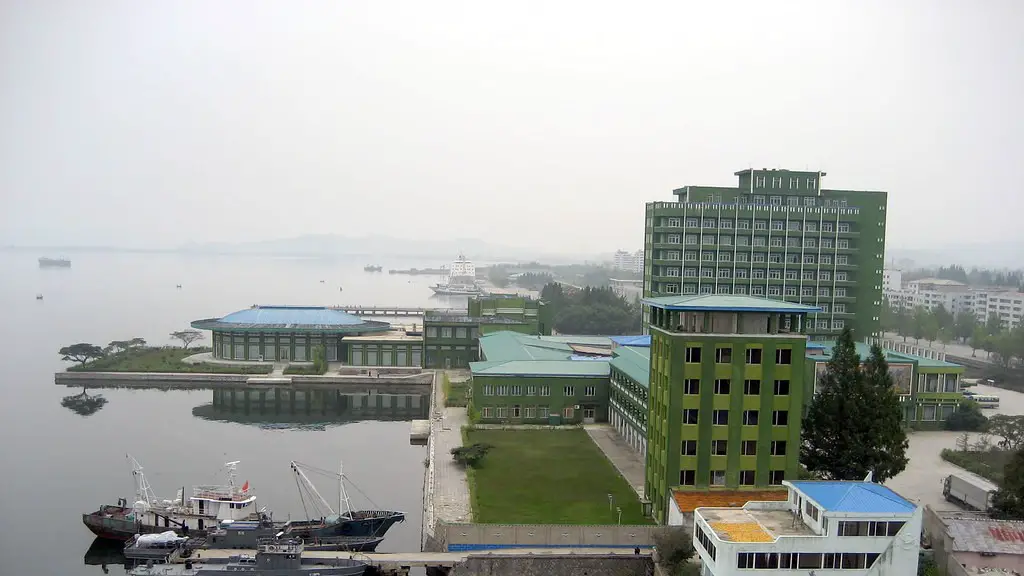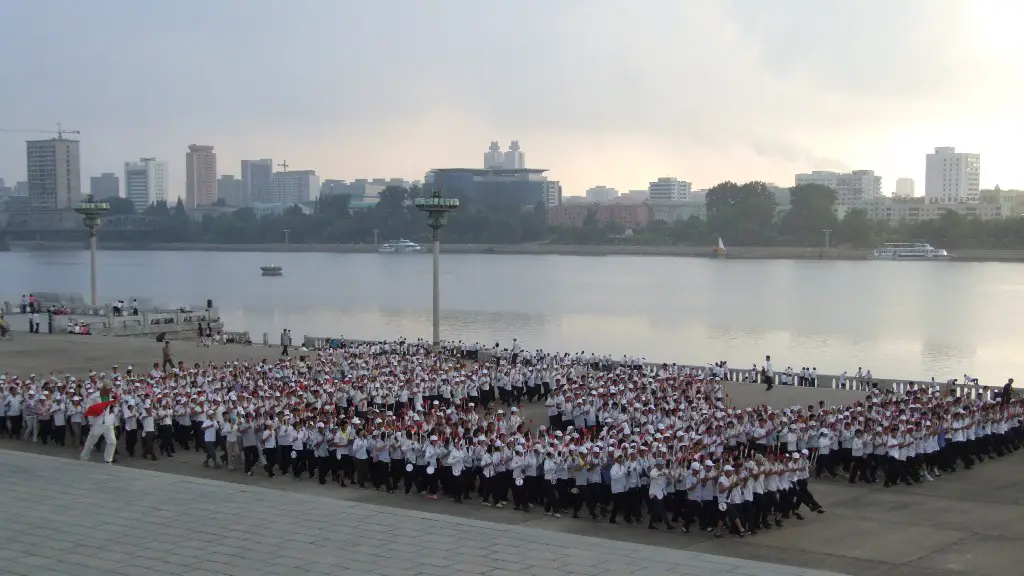As time goes on, tensions between the United States and North Korea continue to mount. From threats of nuclear war to heated rhetoric between the two countries, it’s clear that any potential outbreak of hostilities between the two nations would have catastrophic results. But will the US and North Korea ever go to war?
The answer depends on a variety of factors, namely the resolve of both countries. While the US has shown a willingness to use force in the past in order to achieve its objectives, North Korea is an unpredictable nation with a history of taking extreme measures to ensure its survival. For the US, any potential conflict with North Korea would pose significant risks to the US and its allies, making it a gamble that most policymakers would likely be wary of taking.
This issue is further complicated by the fact that the two countries have vastly different objectives when it comes to their respective visions for the future of the Korean peninsula. The US wants a peaceful and unified Korea that is free from the Kim regime and its nuclear ambitions, while North Korea wants nothing more than regime preservation and a guarantee of security from outside interference. This is a difficult goal to achieve, especially for a nation that has historically been hostile towards its neighbors and the US.
It’s also worth noting that North Korea has a long history of escalating tensions in order to gain leverage from the international community. This makes any potential conflict difficult to predict, as North Korea has often proven willing to take unpredictable risks in order to get its way. This, combined with the fact that the US and other powers are unwilling to resort to military action in order to address the situation, further complicates the issue.
At the same time, the fact that North Korea’s regime relies heavily on the threat of military power to remain in control of the country means that it is unlikely to be quick to capitulate if the US does decide to take military action. This means that any potential conflict could quickly escalate, potentially leading to a full-fledged war with devastating consequences for the entire region.
Regardless of the potential consequences, it’s clear that the US is unlikely to go to war with North Korea. Even if the US were to decide to do so, the risks involved are far too great to make it a feasible option. Instead, the US and its allies will likely continue to pursue a strategy of containment and diplomacy in order to try and resolve the situation. All sides need to remain vigilant in order to ensure that tensions don’t escalate further and that any outbreak of hostilities is prevented.
External Aid
The Republic of Korea (ROK) is the neighbor of North Korea. The ROK is committed to peace on the Korean peninsula and has been instrumental in moderating tensions between the US and North Korea. The ROK has also provided extensive aid to North Korea, which could potentially help to ease the situation. However, North Korean leaders have been unwilling to accept outside aid and many analysts believe this is because they do not trust the motives of outside powers, particularly the US and its allies.
The ROK is not the only player in the region, however. Both China and Japan have also provided substantial aid to North Korea, and both countries could potentially act as mediators and intervene in any potential conflict. Both countries have long-standing and close ties with North Korea and a significant influence over its decisions and actions. This could be key in moderating the situation should a conflict ever arise and must not be overlooked by policymakers in the US and elsewhere.
Finally, South Korea’s commitment to peace and its desire to see a peaceful resolution to the current conflict should not be overlooked. South Korea has been a stalwart ally of the US, and a major beneficiary of US security assistance. It also maintains close diplomatic ties with North Korea and has a vested interest in a peaceful resolution to the current conflict. South Korea’s role in the region should not be underestimated and its efforts to find a peaceful solution should be supported.
Economic Sanctions
The US has long relied on economic sanctions to try and pressure North Korea into changing its behavior. The US has imposed a wide array of sanctions on the country, ranging from conventional economic measures to secondary sanctions aimed at third parties that do business with North Korea. These sanctions, however, have had limited effect on North Korea’s behavior thus far.
Opinions on the effectiveness of the sanctions differ amongst policymakers and analysts. Some believe that the sanctions have caused considerable economic hardship for the North Korean people and have pushed the country to the brink of collapse. Others argue that the sanctions have not been effective in curtailing the North Korean government’s nuclear ambitions and have not forced the regime to make meaningful concessions.
Whatever the case, it’s clear that the US will have to take more creative steps in order to bring about a peaceful resolution to the current crisis. However, it’s worth noting that North Korea is unlikely to change its behavior unless it feels that its economic and political interests are being safeguarded, making economic sanctions an imperfect solution at best.
US Position
The US government has been consistent in its position on North Korea. It has repeatedly stated that it will not accept a nuclear-armed North Korea and that it will not stand by and allow Pyongyang to continue developing its nuclear weapons program. The US has also made it clear that it is willing to take military action if Pyongyang decides to strike first or if it is deemed necessary to protect US interests.
At the same time, the US has also been adamant in its dedication to a diplomatic solution. The Trump administration has sought to engage with North Korea directly in order to find a pathway to peace, and the US is also supportive of the current denuclearization talks between the two countries. The US is also keen to work with regional partners, such as South Korea, Japan and China in order to bring about a peaceful resolution to the current tensions.
The US has also taken pains to reassure North Korea that it is not interested in regime change and instead seeks to promote peace and stability in the region. This has been demonstrated by the US’ willingness to accept a gradual denuclearization process and its willingness to take steps to reduce tensions, such as pulling its troops out of South Korea and agreeing to a moratorium on joint military exercises with South Korea.
Intelligence
US intelligence agencies have played a major role in monitoring North Korea’s activities in recent years. The US has used a variety of methods to gather intelligence, including satellite imagery and signals intelligence. This intelligence has proven invaluable in helping policymakers make informed decisions about the North Korean situation. With this information, the US can better understand the true intentions of the North Korean regime and make informed decisions on how best to pressure it into making meaningful concessions.
At the same time, the US has also used its intelligence agencies to monitor North Korean nuclear and missile tests. This has provided the US with a better understanding of the nature of North Korea’s nuclear program and has allowed it to track the development of North Korea’s weapons arsenal with greater accuracy.
Finally, US intelligence has also helped the US to identify and disrupt any potential North Korean attempts at international terrorism or other hostile acts. In recent years, US intelligence agencies have helped to break up a number of North Korean-linked terrorist plots and have also helped to disrupt the activities of North Korean hacker networks.
International Support
The US has also sought to rally international support for its campaign against North Korea. In recent months, the US has worked with its allies in the region, such as Japan and South Korea, to coordinate efforts to pressure the North Korean regime. The US has also sought to build a coalition to enforce economic sanctions against North Korea, enlisting the support of China and Russia for this effort.
At the same time, the US has also sought to work with the United Nations Security Council to pass resolutions condemning North Korea’s actions and to impose tougher sanctions. The US has taken this tactic in an effort to build international consensus around the position that a nuclear-armed North Korea is unacceptable and must be stopped.
Finally, the US has also been vocal in its condemnation of North Korea’s human rights abuses. The US has repeatedly called on the North Korean regime to end its abuses and has sought to put pressure on the country’s leadership to do so. The US has also urged other countries to join its call for North Korea to end its abuses and to hold the regime accountable for its actions.





